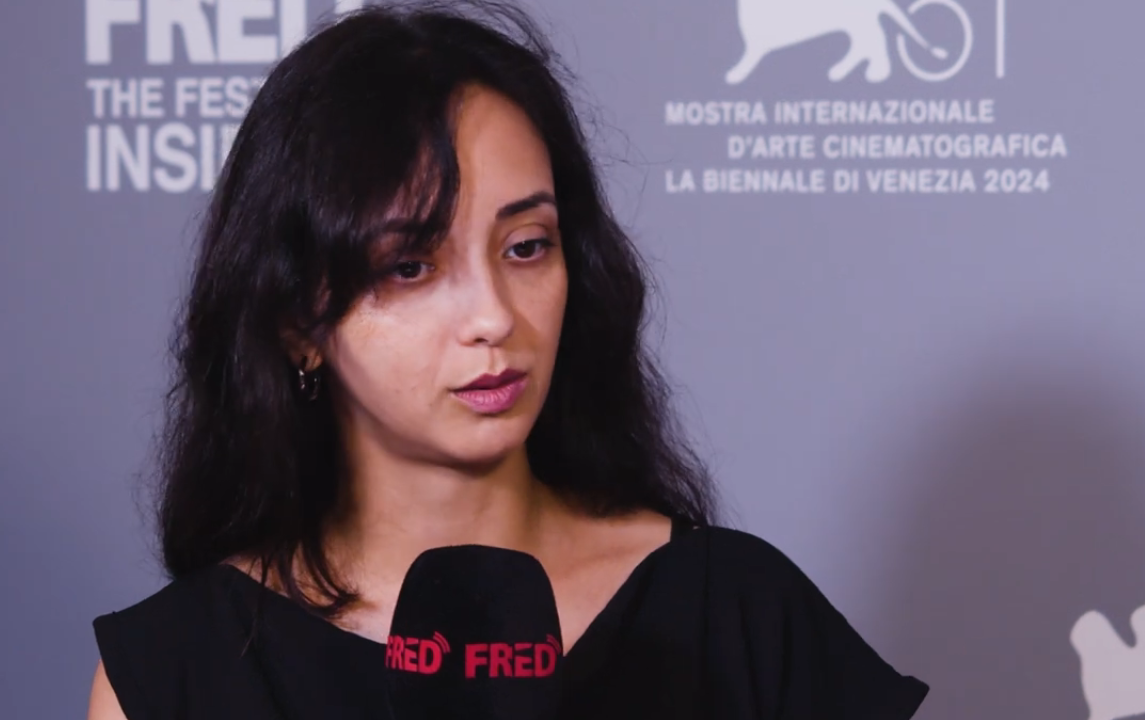
Anastasia Trofimova, screenshot from Fred Film Radio by the IMI
The documentary “Russians at War” by Russian director Anastasia Trofimova, who spent seven months living with Russian soldiers near the front line in Ukraine and told their story, was screened at the Venice Film Festival. She saw no signs of war crimes during her time at the front line, reports Reuters.
In her statement on the film festival’s website, the director says that it is an “anti-war film” and that “Russians at War” is her “desperate search to understand my birth country and my people.”
Film summary and the filmmaker’s comments
As Reuters writes, Trofimova worked without authorisation, embedding herself with a battallion making its way across eastern Ukraine to get a rare glimpse of the Russian army.
Speaking before the film’s premiere, the director said, “In Russia, they are these heroes who never die. In the West, they are mostly war criminals, war criminals, war criminals. To me, the biggest shock was to see how ordinary they were. Absolutely ordinary guys with families, with a sense of humour, with their own understanding of what’s happening in this war.”
Reuters reports that the documentary shows only brief glimpses of actual fighting and gives no sense of the destruction Moscow’s forces have inflicted on Ukraine, with one of the soldiers dismissing as “impossible” accusations that Russian troops had committed war crimes.
Many soldiers admit they are only fighting for the money and grow increasingly disillusioned, denouncing coverage of the war on state media as “lies”. Others fight out of camaraderie, with attitudes hardening as the casualties mount.
“People might not really understand the reasons behind (the war), but they start to fight because they lost someone. And it’s maybe a question of revenge,” Trofimova said.
Trofimova said she saw no signs of war crimes during her time near the front. “I think in Western media, that’s what Russian soldiers are associated with at this point, because there were no other stories. This is another story,” she said.
Trofimova was asked at the Venice press conference on whether it was “ethical” to humanize Russian soldiers, in light of war crimes committed by Russia’s army during its ongoing invasion of Ukraine, writes Deadline.
“I find it a little bit of a strange question, if we can humanize or not humanize someone. So, are there lists of people who we can humanize and people who we can’t? Of course, we have to humanize everyone. This is a huge tragedy for our region, first of all, and for the entire world. If we don’t see each other as people… these black and white stereotypes about each other, this will only make the war continue. This will only make the hatred grow… unfortunately, that’s sort of the route taken by politicians, but I don’t think that this is the route that regular people should take,” replied Trofimova.
Response by Ukrainian artists
Ukrainian documentarist Olha Zhurba, whose film “Songs of Slow Burning Earth” also premiered in Venice, criticised the decision to screen the Russian film, saying it was too soon to portray the invaders in a sympathetic light.
“I think Russian film-makers should … show the real face of the criminals of this war,” Olha Zhurba said.
Trofimova dismissed the criticism, saying it was vital not to fuel the hatred further and instead seek common ground. “Since the beginning of the war on February 24, 2022, there have been a lot of bridges destroyed between Russia and the West. I would like this film to be maybe not a bridge, but at least a rope I can throw across and to help us see each other,” she said.
Trofimova praised Zhurba’s film, but voiced her disquiet at the ending, where Ukrainian children are thinking about what they can do to build a better Ukraine and are contrasted with Russian kids, who are shown as marching and singing war songs.
“I found this to be playing into that whole narrative that Russians, by definition, are these aggressive and awful people… you know that it’s in their blood to be to be this way,” says Trofimova.
Ukrainian filmmaker and screenwriter Iryna Tsilyk pointed out that Anastasia Trofimova previously worked for the Russian state propaganda channel RT (formerly Russia Today).
“Apparently, this film is a cookie-cutter example of Russian propaganda. The director used to work for Russia Today and liberally uses the tools she’s familiar with. This is not the surprising part, something else is. This film premiered in Venice, and is going to Toronto after that, as far as I know. And this is where the bleak feeling of the century-old fatigue from such cynicism and unscrupulousness on the part of top film festivals starts to settle in,” Tsilyk wrote on Facebook.
“It has it all. For the author, the war and invasion began in 2022; not a word about Crimea, instead there are mentions of a ‘civil war’ in Ukraine. The director also says that Russia has not taken part in any wars in a long time and that war used to be something far removed and abstract for her as a child. Apparently, Russia’s wars in Chechnya, Georgia, Transnistria, etc., were not real to her, either. And so on. ‘We are the little people, no one really wanted to fight, except for the money, but now our poor heroes are being killed in Bakhmut, here are their loved ones crying, who could possibly need all this, we love peace,'” Tsilyk said.
